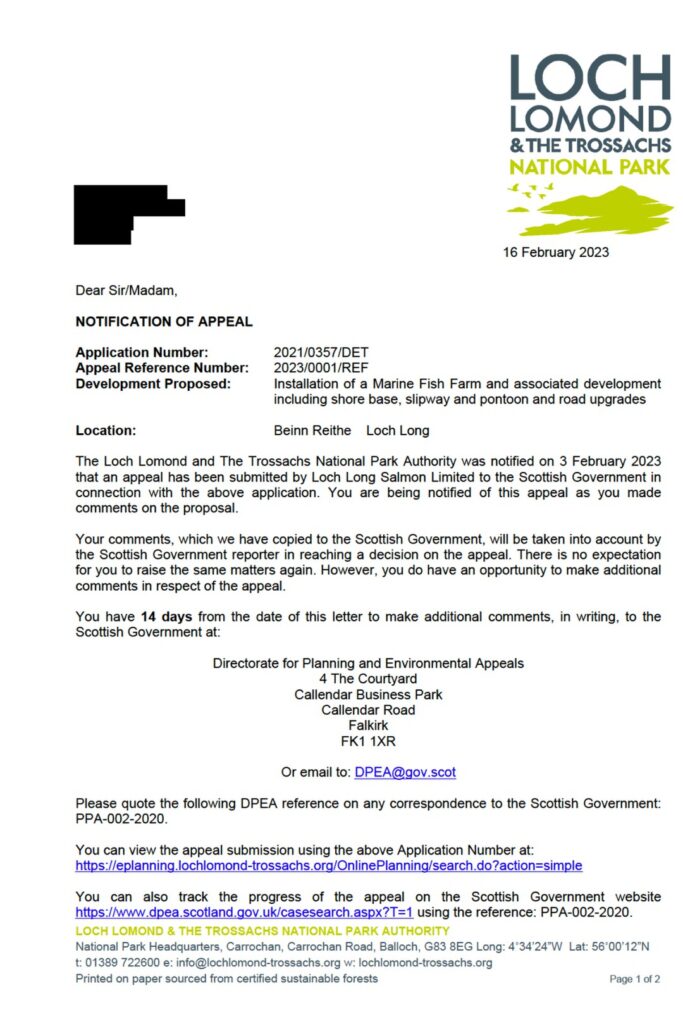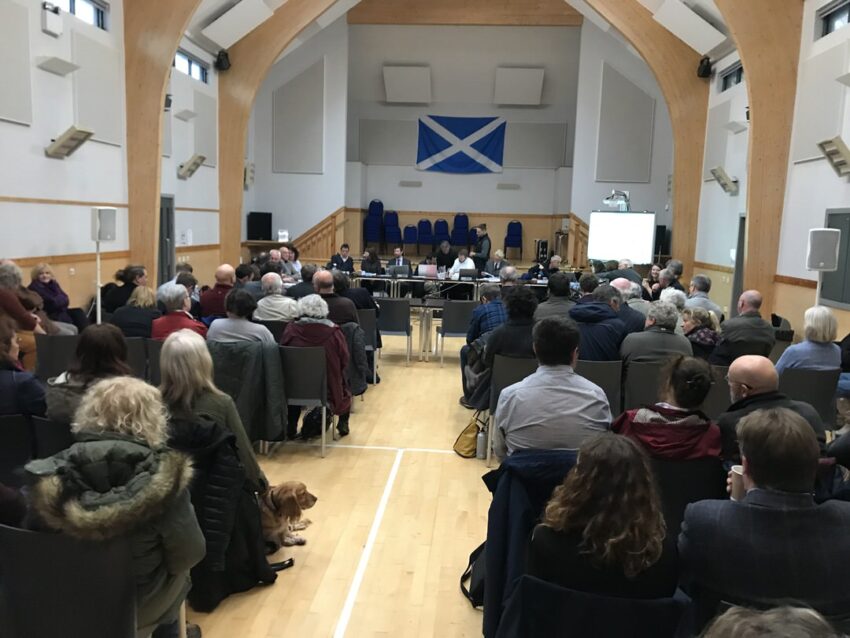[Updated 26 Feb, 2023]
The following is some pertinent information you may wish to consider including in your opposition submission to the DPEA. Comments must be submitted no later than March 3, 2023.
The list is by no means exhaustive. Please see related AFFtheClyde posts for more information on the Beinn Reithe proposal.
– Loch Long Salmon (LLS) is a recently formed start-up with no previous practical experience of semi-closed containment technology.
– The National Park’s main rationale for refusal was that the development did not meet its aims which are to conserve and enhance the natural and cultural heritage of the area; promote the sustainable use of the natural resources and to promote sustainable social and economic development of the area’s communities.
– The development is inappropriate for its National Park location. The visual impact of the industrial site near the head of Loch Long will will have major effect on the scenic vistas of the area.
– A Freedom of Information request submitted by AFFtheClyde to Forestry and Land Scotland confirmed the presence of otters, badgers and seals at the proposed site as well as evidence of red squirrel and sparrow hawks.
– Claims that the technology has been successfully tried and tested is questionable. A trial of the aquaculture system by Cermaq Canada was stopped after a technical fault reduced water quality, resulting in fish mortality.
– LLS has failed to provide examples of other sites that have successfully collected 85% of solid waste. Failure to collect 85% would mean that the operation would exceed SEPA environmental requirements.
– No detailed evaluation of the risk of odour nuisance in connection with the storage and handling of the solid wastes pumped ashore or disposal of salmon morts has been undertaken.
– Waste sludge on land is likely to create an odour issue.
– There are animal welfare, husbandry and viral disease issues related to the anticipated high stocking densities.
– The containment plastic outer skirt is unlikely to withstand strong wind and turbulent swell conditions as was confirmed by the incident last year in Sognefjord, Norway where a semi-closed containment salmon farm was damaged in a storm causing a fuel spill. Although the site is relatively sheltered, extreme weather events are becoming more frequent.
– Chemicals including hydrogen peroxide may have to be used to contain and treat bacterial and viral disease.
– Spreading on land of the untreated waste is unlikely to be approved by authorities.
– LLS attempts to compare the merits of semi-closed systems with open net fish farms, however this is superfluous considering that the site selected would be highly unsuitable for open net production.
– LLS claim that the proposed development supports the blue economy. Salmon aquaculture is resource-intensive and therefore has significant environmental impacts, including the depletion of proteinaceous food resources and contamination of surrounding waters. In order to grow and produce salmon, farms use large amounts of fishmeal and fish oil, which are made from wild-caught fish such as anchovies, sardines, and herring. It’s estimated that some 25% of all fishes caught in the ocean, are turned into fishmeal. This practice therefore contributes to overfishing and reduces the availability of these fish for both human consumption and as food for other marine species.
– LLS claim that the development is of ‘national importance’. This is not the case as the technology is constrained by the requirement for sheltered locations in sea lochs where there are much greater risks from pollutants.
– Loch Long Salmon claim that in the escape incident at Carradale in 2020 the open net facility involved was in no way similar to the system proposed for Loch Long. However, the destruction at Carradale was due to wind and water turbulence. The semi-enclosed system is in fact more vulnerable to damage by wind and turbulence as demonstrated at the Osland Havbruk site in Sognefjord in Norway. There is an elevated risk with semi-enclosed systems breaking up due to the water barrier of the outer impervious containment with consequent escape of farmed fish.
Loch Long and the Trossachs National Park (NPA) was notified on 3 February, 2023 that Loch Long Salmon Ltd (LLS) has submitted an appeal in respect of the refusal of planning permission for a semi-closed fish farm at Beinn Reithe, Loch Long.
AFFtheClyde continues to campaign against this industrial development which, if built, would be the largest fish farm in Scotland.
Individuals and groups who last year submitted representations opposing the project should now submit additional representations/comments opposing the fish farm to the Scottish Government (DPEA) no later than 3 March, 2023. Groups and individuals who did not submit representations in 2022 are also encouraged to submit comments opposing the fish farm.
The following are the reasons the NPA refused planning consent:
– The proposed development would not comply with Overarching Policy 1, Overarching Policy 2 or Natural Environment Policy 1 of the Local Development Plan as it would not relate well to the landscape context and setting and would not be sympathetic to local built forms.
– The development would have an industrial appearance in an area of undeveloped coastline.
– The development would not safeguard visual amenity and important views and would not protect or enhance the rich landscape character of the National Park.
– The development would adversely impact the special landscape qualities for which the National Park has been designated.
– The proposed development would not comply with Natural Environment Policy 15: Coastal Marine Area of the Local Development Plan as it would not be in alignment with the National Marine Plan policies and objectives. Specifically, the development would not be in alignment with National Marine Plan Aquaculture Policy 5 that aquaculture developments should avoid and/or mitigate adverse impacts on the seascape, landscape and visual amenity of an area and Objective 2 for Wild Salmon and Diadromous Fish to maintain healthy salmon and diadromous fish stocks.
– The proposed development, following a Habitats Regulations Appraisal/appropriate assessment under the Conservation (Natural Habitats, &c.) Regulations 1994, in relation to the Endrick Water SAC would have an adverse effect on the integrity of the Endrick Water SAC, designated for Atlantic salmon and lamprey.
– The technology proposed has not been trialled in Scotland and there are inherent risks from an escape incident to wild salmon populations which are already fragile.
– The terms of the Habitats Regulations Appraisal/appropriate assessment (in relation to the Endrick Water SAC) are adopted and it is also considered that the proposed development is contrary to Natural Environment Policy 2 (which repeats the provisions regulations 48 and 49 of the Habitats Regulations 1994) as the derogation tests set out in paragraphs (a) “there are no alternatives and” (b) “there are imperative reasons of overriding public interest” of that policy cannot be met by the proposed development.
– It has not been possible to assess the impacts of the proposed woodland removal and compensatory planting as insufficient information has been provided by the applicant. The information provided is insufficient to meet the requirements of the Scottish Government Control of Woodland Removal Policy and the loss of woodland does not meet the test in Natural Environment Policy 8 of the Local Development Plan.
– The proposed development would be contrary to the first, second and third statutory aims of The National Park (as set out in section 1 of The National Parks (Scotland) Act 2000).
– The National Park Authority must, in its determination of the application, give greater weight to the first aim “to conserve and enhance the natural and cultural heritage of the area” as it is in conflict with the fourth aim.
Please submit your objections (including appeal reference number PPA-002-202) no later than March 3, 2023 by email to:
DPEA@gov.scot
or by postal mail to:
Directorate for Planning and Environmental Appeals,
4 The Courtyard,|
Callendar Business Park,
Callendar Road,
Falkirk,
FK1 1XR.
Direct link to planning appeal.

Photo shows Loch Long Fish Farm Public Hearing, Arrochar – October, 2022.
